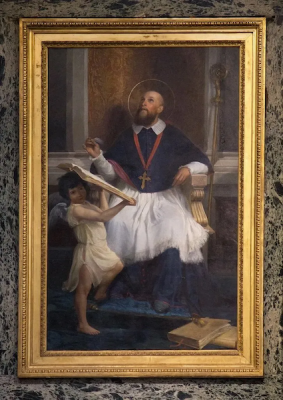Gospel in Art: Feast of Saint Francis de Sales

Portrait of St Francis of Sales, by Attilio Palombi, 1898 © Chiesa del Sacro Cuore di Gesù, Rome
Source: Christian Art
Gospel of 24 January 2024
Mark 4:1-20
Jesus began to teach by the lakeside, but such a huge crowd gathered round him that he got into a boat on the lake and sat there. The people were all along the shore, at the water's edge.
He taught them many things in parables, and in the course of his teaching he said to them, 'Listen! Imagine a sower going out to sow. Now it happened that, as he sowed, some of the seed fell on the edge of the path, and the birds came and ate it up. Some seed fell on rocky ground where it found little soil and sprang up straightaway, because there was no depth of earth; and when the sun came up it was scorched and, not having any roots, it withered away. Some seed fell into thorns, and the thorns grew up and choked it, and it produced no crop. And some seeds fell into rich soil and, growing tall and strong, produced crop; and yielded thirty, sixty, even a hundredfold.' And he said, 'Listen, anyone who has ears to hear!'
When he was alone, the Twelve, together with the others who formed his company, asked what the parables meant. He told them, 'The secret of the kingdom of God is given to you, but to those who are outside everything comes in parables, so that they may see and see again, but not perceive; may hear and hear again, but not understand; otherwise they might be converted and be forgiven.'
He said to them, 'Do you not understand this parable? Then how will you understand any of the parables? What the sower is sowing is the word. Those on the edge of the path where the word is sown are people who have no sooner heard it than Satan comes and carries away the word that was sown in them. Similarly, those who receive the seed on patches of rock are people who, when first they hear the word, welcome it at once with joy. But they have no root in them, they do not last; should some trial come, or some persecution on account of the word, they fall away at once. Then there are others who receive the seed in thorns. These have heard the word, but the worries of this world, the lure of riches and all the other passions come in to choke the word, and so it produces nothing. And there are those who have received the seed in rich soil: they hear the word and accept it and yield a harvest, thirty and sixty and a hundredfold.'
Reflection on the painting
Today we celebrate the Feast of Saint Francis de Sales (1567-1622). He was raised in a devout Catholic family. The "de Sales" part of his name is derived from the Château de Sales, a castle near Thorens-Glières, Savoy where he was born. His parents instilled in him a strong faith from an early age. His father, a nobleman, intended him for a legal and political career, but Francis felt a calling to the priesthood. Francis pursued his education at the Collège de Clermont in Paris and later at the University of Padua. Excelling in his studies, he earned a doctorate in law and theology. Despite his academic success, he struggled with doubts about his vocation. After a profound spiritual experience, marked by a vision of God's immense love for him, Francis resolved to dedicate his life to God. He was ordained a priest in 1593 and returned to the region of Chablais, where he faced the daunting task of re-evangelising a population that had embraced Calvinism.
His written works, especially "Controversies", addressed theological differences in a respectful and charitable manner. His efforts led to the conversion of thousands, earning him the title "the Gentleman Saint". In 1602, Francis was appointed Bishop of Geneva, a diocese that had been without a resident bishop for over two decades. His approach to pastoral care was marked by kindness and understanding, dispelling the harsh methods employed by some in the Counter-Reformation. Francis de Sales was declared a Doctor of the Church by Pope Pius IX in 1877.
Francis insisted that every Christian was called to holiness and sanctity, to be within their own state in life. He was thus one of the main proponents of advocating the universal call to holiness. Our late-19th-century painting shows St Francis, wearing his episcopal cross, writing in a book held by an infant angel. Two books are by his feet evoke the saint's academic credentials as Doctor of the Church.
LINKS
Gospel in Art: https://christian.art/
Today's Reflection: https://christian.art/daily-gospel-reading/mark-4-1-20-2024/


















